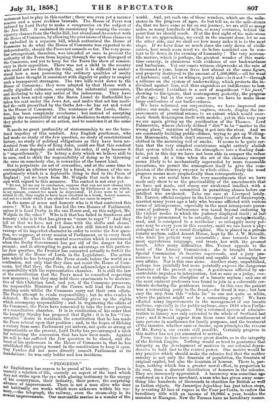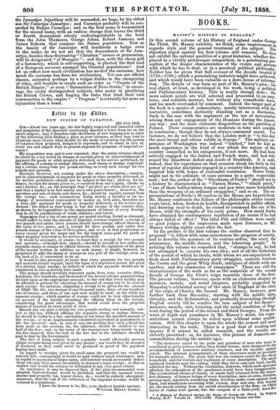"PROGRESS."
AN Englishman has reason to be proud of his country. There is scarcely a relation of life, scarcely an aspect of the land which does not strike upon the eye with glaring testimony to the energy Of his countrymen, their industry, their power, the surprising advance of improvement There is not a man alive who does not habitually see works which were unknown within his me- 111°17,—the telegraph, the railway, even the steam-ship in its newest improvements. Our mercantile marine is a wonder of the world. And, yet each one of those wonders, which are the mile- stones-in the progress of ages, do but tell us, as the mile-stones do, that we have come so far on our journey, we are still so many miles so many hundreds of miles, SO many centuries, behind ti
i e poethat we should reach. Hat the first sight of the mile-stone
that we are approaching, we exult in the amount done, let us see the other side, mad we shall see how many miles it is to the next stage. If we have done so much since the early dawn of civili- zation, how much more must we do before mankind can be con- tent to lie down in the evening of humanity ! The very mercan- tile marine, which is perhaps, the greatest wonder of this maxis- time country, is clamorous with evidence of our backwardness and barbarism. Yet our coasts witness shipwrecks at the rate of a thousand a year, human lives lost almost at the same figure, and property destroyed to the amount of 1,50010001.—ell for want of harbours; and, let us whisper, partly also—is it not ?—through a reliance on the system of underwriting, which protects the in- dividual against loss, and thus engenders an indifference to lug. The stationary Leviathan is a sort of magnificent "laic facet," showing to foreigners, that contemporary posterity, the progress of the age ; but in the very same year we have to make these large confessions of our backwardness.
We have reformed our corporations, we have improved our cities ; our roads, our factories, engines, streets, display the im- provements of practical science to an extant which would over- stock South Kensington itself with models ; yet in this very year we are again giving up the purification of the Thames. Lord Palmerston, who so cleverly defined "dirt" to be "matter in the wrong place," connives at letting it get into the river. And we are constantly building public edifices trying to get up Welling- ton Monuments, which don't succeed, only to allow them to be clothed in the mourning veil of smoke. It seems to be quite cer- tain that the very simplest contrivance might entirely abolish that system which converts the atmosphere into a floating dust- hole, yet to this day we have not been able to conquer the refuse of our coal. At a time when the art of the chimney sweeper seems likely to be mechanically superseded by more reasonable inventions, we permit the atmosphere itself to give the com- plexion of the chimney sweeper to whole cities. Truly the word progress means more prophetically than retrospectively.
Even in our social laws the very amendments that we have made only show to us the practicability of the amendments that we have not made, and stamp our awakened intellect with a greater folly than we committed in permitting abuses before our intellect was awakened. Take one case at Liverpool lately. Mr. Turner, official assignee in the Liverpool Court of Bankruptcy, married many years ago a lady who became afflicted with various forms of intemperance, especially in the most intemperate parox- ysms of jealousy. Forbearance was taxed beyond enduring by the violent modes in which the jealousy displayed itself; at last the lady is pronounced to be actually, instead of metaphorically, mad, and is consigned to a madhouse ; as unhappily many per- sons may be every year in this country, until we can learn a pliy- siological as well as a moral discipline. She is placed in a private lunatic asylum, called Aoomb House, kept by hfr. J. W. Metcalfe, who finds his patient very intractable ; uses towards her the most opprobrious language and treats her with the grossest insult. After many difficulties Mrs. Turner appeals to the head of the Lunacy Commission ; she is brought before a Special Commission de lunatic°inquirendo and a jury pro- nounces her to be of sound mind. and capable of managing her own affairs. Nor is this case alone. Another story, unpublished, perhaps less painfully but more pointedly exposes the dangerous character of the present system. A gentleman afflicted by un- controlable impulses to intoxication, but as sane as a judge, con- sents to undergo the discipline of a lunatic asylum ; and one of the most eminent professors was found to join in a colourable cer- tificate declaring the gentleman insane. In this case the patient was a consenting party to the fraud,—for fraud it was ; but how easy the step from this "white lie" to one not quite so white, where the patient might not be a consenting party ! We have effected many improvements in the management of our lunatic asylums, especially in the public asylums, since 1816 when Parlia- ment first began to inquire. But a reformed system of adminis- tration in lunacy was only extended to the whole of Scotland last year ; and it would appear from these eases that confinement of sane persons in madhouses for family purposes, and the treatment of the inmates, whether sane or insane, upon principles the reverse of Mr. Rarey's, are events still possible. Certainly progress in this matter has not yet amounted to arrival.
From time to time have arisen great doubts as to the integrity of the British Empire. Nothing would so tend to guarantee that integrity as the development of motives in our colonial depen- dencies to hold fast to the central power. One motive would be any practice which should. make the colonies feel that the mother country is not only the fountain of population, the fountain of original capital, but also the fountain of honour. There is, per- haps, nothing which has a greater moral effect, in proportion to its cost, than a discreet distribution of honours in the colonies. They are immensely appreciated. A baronetcy was sometime ago conferred on a Parsee merchant, a man who has given away some- thing like hundreds of thousands in charities for British as well as Indian objects. Sir Jarasetjee Jejeebhoy has just taken by investing 25 lacs of rupees in the Four per Cents, to endow hereditary title with an income of 10,0001. a year, besides the mansion at Mazagon; Now the Parsees have no hereditary names.
Sir Jamsetjee Jejeebhoy will be succeeded, we hope, by his eldest eon Sir Cursetjee Jamsetjee; and Cursetjee probably will be suc- ceeded by Dakjee Cursetjee ; and so the first name is transmitted for the second name, with an endless change that leaves the third or fourth descendant utterly nndistinguishable in the herd from the John Thomases, George Johns, Robert Jameses, and James Roberts that compose the Parsee population. Now as the family of Sir Jamsetjee will desiderate a badge even in the name, do we not see that the descendants of Sir Jam- setjee, besides these fluctuating" Christian" names or prienomina, will be designated "of Mazagon " ; and thus, with the cheap gift of a baronetcy, which is self-supporting, is planted the first seed of a European surname amongst the Oriental populations? And let us reflect how much civilization has needed the surname, how much the surname has done for civilization. Yet can our official classes, animated perhaps by a vulgar dislike to the cheapening of titles, still hesitate to create such an order as "Counts of the British Empire," or even " Baronetoies of Nova Scotia," to encou- rage the really distinguished subjects who assist in glorifying the British Crown, and forging the links that bind their own communities to the empire ? " Progress" is certainly far more an injunction than a boast.



























 Previous page
Previous page